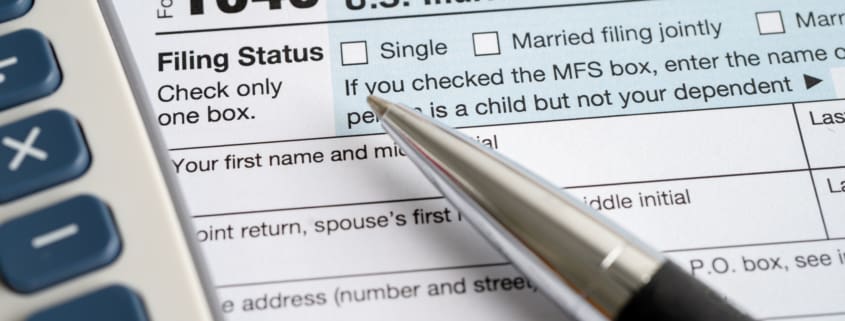Nine Tax Tips for Preparing Your Income Tax Return
When it comes to running your business, there are various rules to follow to ensure you accurately report your business income and take proper deductions, determine whether you can pay workers as employees or independent contractors, and whether you qualify for one or more credits. However, we have compiled a short (but not exhaustive) list of items to consider while reviewing your profit and loss statement and general ledger, and in finalizing your income tax return:
- No Commingling of business and personal assets – For business entities such as corporations and limited liability companies, you should keep separate bank accounts for each entity and for your personal expenses. Comingling business and personal expenses could allow the IRS to recharacterize personal expenses paid by the business as distributions or wages and creditors to pierce your “Corporate Veil.”
- Corporate Owned Life Insurance and Disability Insurance – Generally, an employer may take out a life insurance policy on the life of an employee and deduct the expenses as a business expense. However, the corporation would need to be named the beneficiary and possibly the owner of the policy. The insurance policy would be considered a corporate asset and a subsequent transfer of the policy before the insured (generally a business owner) dies could give rise to a taxable event.
- IRS Can Verify Your Income from Merchant Processor Reports – Businesses who accept credit cards payments from their clients should receive form 1099-K from their merchant processor. Banks and merchant processors will report to the IRS gross payments you received through credit or debit cards. Before finalizing your income tax return, review your 1099-K and compare the amount reported in box 1(a) and 1(b) to the amount reported on your income tax return as “Gross Receipts or Sales.” Business owners are urged to reconcile information on reports submitted by banks and merchant processors to ensure there are no errors. There are legitimate reasons why the amount reported on the form 1099-K does not match your gross receipts, which include amounts collected from customers for sales tax and shipping costs.
- Independent Contractors vs. Employees – In determining whether you should hire a worker as an employee or as an independent contractor, be familiar with the IRS’ rules and your state’s laws to properly characterize a worker as an Independent Contractor. It may seem beneficial financially to hire independent contractors. Yet, if the IRS reclassifies a worker as an employee, your business will be liable for current and prior years’ payroll taxes in addition to late penalties and interest. Additionally, officers, directors, and even non-owners may be held liable for a portion of the payroll taxes held but not paid over to the IRS and your state tax agency under a trust fund penalty.
- Vehicle Expenses – Generally, trips to and from your home and work are not deductible but are deemed personal commuting miles. If you drive many miles for work and are not reimbursed by your employer (or if you are an independent contractor), keep a log of your daily business miles. At the end of the year, compare your business miles to your total miles driven. This percentage will determine the same percentage of auto expenses you can deduct for gas, insurance, depreciation, etc.
- Recordkeeping – Where the IRS denies a business deduction, the first step is to produce the expense receipts and payment records to the IRS revenue agent. If you cannot substantiate your expenses, you generally cannot deduct. So when you’re debating whether or not the expenses are business related, keep the receipt, just in case you are audited.
- Affordable Care Act – These tax credits will allow some small businesses to cover up to 35 percent of the health care premiums a small business pays to insure its workers. In 2014, the tax credit will increase to 50 percent.
- Unusually Large Deductions – Large business deductions can be red flags for the IRS to further examine your return. To minimize the chances of an audit, legibly write an explanation of the deduction and, if possible, attach evidence.
-
Items the IRS normally assigns a return to a field examination:
- Returns which require an in-depth knowledge of accounting principles.
- Issues which require on site inspection of the taxpayer books, records or assets and/or visitation of the taxpayer place of business.
- Complex Schedule D transactions.
- Returns with unusually complex rental income and expenses.
- Tax shelter returns.
- Donations of real property which would involve an engineering specialist.
- Alimony – if it appears there is a property settlement involving business property (accounts receivable, etc.).
- Returns which would most likely have voluminous records.
- Extensive time frame required to complete the examination.
- Inventories are substantial and material.
- Termination of business before the end of the taxable year.
- Unusual issues that appear to be complex and time consuming to develop (Complex oil or mineral explorations, unstated interest (IRC Sec. 483), nontaxable transfers, etc.).
- Size of a business (high gross receipts, etc.).
- Businesses not adaptable to office examination, such as manufacturers, auto dealers, and funeral parlors.
- Individual returns requiring the full accounting skills of a Revenue Agent, if a Tax Compliance Officer is not available in the geographical location of the taxpayer.
Contact our San Diego tax attorney – we can provide the tax advice you need!



